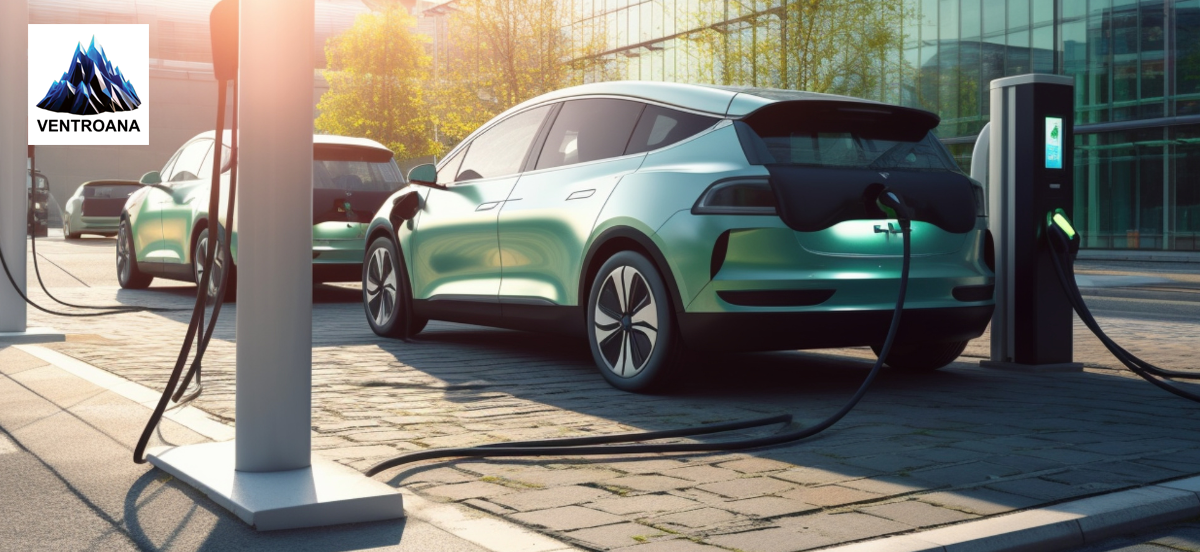E-Mobility
July 23, 2024

The automotive industry is undergoing a seismic shift, with electric vehicles (EVs) at the center of this transformation. Environmental concerns, technological advancements, and changing consumer preferences are converging to redefine the future of mobility with electric vehicles.
This blog delves into electric vehicles' potential, benefits, technological innovations, and broader implications for our transportation systems.
Electric vehicles are not a new concept. The first electric car was developed in the early 19th century, but it was quickly overshadowed by gasoline-powered vehicles due to their longer range and faster refueling times. However, the landscape has drastically changed in recent years.
With advancements in battery technology, increasing environmental awareness, and supportive government policies, EVs have made a powerful comeback. The unit sales of the Electric Vehicles market are anticipated to reach 17.07m vehicle units by 2028.
McKinsey estimates that the global micro-mobility market will reach about $ 360 billion by 2030.
As this new era of mobility unfolds, the increasing presence of electric vehicles silently gliding down our roads is unmistakable. Once a niche market catering to the eco-conscious, electric cars have now entered the mainstream automotive scene. An electrifying presence is set to grow remarkably, signaling a significant shift in transportation.
The rapid advancement of technology is a key driver of the electric vehicle revolution. For consumers, many technological innovations are helping to overcome the traditional limitations of EVs and make them an attractive option.
The development of lithium-ion batteries has been a game-changer for the EV industry. These batteries offer higher energy density, longer lifespan, and faster charging times compared to previous battery technologies. Ongoing research into next-generation batteries, such as solid-state batteries, promises even greater improvements in energy density, safety, and charging speed.
By 2030, 40 percent of global battery demand could come from China –evenly split between the top two battery chemistries.
The expansion of charging infrastructure is critical to the widespread adoption of electric vehicles. Public charging stations, fast-charging networks, and home charging solutions are becoming increasingly common. Innovations like wireless charging and ultra-fast chargers are also being developed to enhance convenience and reduce charging times.
Modern EVs are designed with aerodynamics and energy efficiency in mind. Advances in electric drivetrains have resulted in vehicles that offer impressive acceleration, smooth and quiet operation, and enhanced handling. Manufacturers are also exploring lightweight materials and innovative manufacturing techniques to improve vehicle efficiency and performance.
McKinsey projects that worldwide demand for EVs will grow sixfold from 2021 through 2030, with annual unit sales going from 6.5 million to roughly 40 million over that period.
The global electric vehicle (EV) market is expanding quickly, propelled by rising environmental awareness, government incentives and subsidies, and advancements in battery technology. In 2024, the revenue in the Electric Vehicles market is projected to reach a staggering US$623.3bn worldwide.
The global market for electric vehicles is anticipated to reach USD 247.20 billion by 2031, growing at a forecasted CAGR of 19.64% from 2024 to 2031.
While the initial excitement surrounding autonomous driving has waned, progress continues. The focus has shifted to refining autonomous technology to meet real-world needs and safety standards. In the era of autonomous mobility approaching, an electric vehicle experience's key component is expected to be autonomous mobility itself, offering convenience and enhanced safety.
One of the most promising indicators of the rise of electric vehicles is the growing acceptance among consumers. As more people experience the benefits of EVs—lower operating costs, reduced environmental impact, and a quieter, smoother ride—the perception of electric vehicles is shifting from a compromise to a smart, preferred choice.
As electric vehicles (EVs) continue to gain traction as a key solution for sustainable transportation, they also face several challenges that must be addressed to fully realize their potential.
One main worry for EV buyers is range anxiety, the fear of the battery dying before finding a charging station. Although modern EVs have better range now, they still haven't matched the distance gasoline cars can travel. Innovations in battery technology, such as higher energy densities and faster charging capabilities, are crucial to mitigating range anxiety.
The expansion and accessibility of charging infrastructure are critical for widespread EV adoption. While urban areas often have adequate charging networks, rural and suburban regions may lack sufficient coverage. Addressing this disparity requires investment in fast-charging stations, home charging solutions, and interoperability between different charging networks.
Although the operational costs of EVs are lower compared to gasoline vehicles due to cheaper electricity and reduced maintenance expenses, the upfront purchase price remains a barrier for many consumers.
The cost of batteries, which accounts for a significant portion of an EV's price, continues to decline but needs further reduction to achieve price parity with internal combustion engine vehicles.
Financial incentives, subsidies, and innovative financing options can help make EVs more affordable and accessible to a broader range of consumers.
Advancements in battery technology are crucial for enhancing the performance, lifespan, and safety of electric vehicle batteries. Research into next-generation batteries, such as solid-state and lithium-sulfur batteries, aims to improve energy density, reduce charging times, and address concerns related to battery disposal and recycling. Developing sustainable practices for battery manufacturing, reuse, and recycling is essential to minimizing the environmental impact of EVs and ensuring their long-term sustainability.
As electric vehicles continue to gain momentum, it is becoming evident that they are a crucial element of a sustainable future. The benefits of EV adoption include significant reductions in greenhouse gas emissions, decreased reliance on fossil fuels, and improved air quality in urban areas.
The future of electric vehicles is promising, with ample opportunities to further enhance EV technology, expand charging infrastructure, and integrate electric vehicles into a comprehensive ecosystem of mobility solutions. This ecosystem includes ride-sharing services and electric public transportation, creating a diverse, interconnected, and sustainable future for mobility.
Electric vehicles represent more than just a technological innovation; they embody a transformative shift towards a cleaner, more sustainable future for mobility. With ongoing advancements in technology and growing consumer acceptance, EVs are poised to reshape the automotive industry and contribute to global efforts to combat climate change. Embracing electric mobility today means paving the way for a sustainable tomorrow, where transportation is efficient, environmentally friendly, and accessible to all.
With our expertise in cutting-edge technologies, commitment to innovation, and deep understanding of the evolving EV landscape, we are dedicated to driving forward the adoption of electric vehicles.
Together, we can navigate the challenges, harness the opportunities, and shape a future where electric mobility is not just a choice but an accessibility of a cleaner, smarter, and more connected transportation landscape. By partnering with us, you gain access to cutting-edge solutions, strategic insights, and practical implementation strategies that ensure your green hydrogen projects are both viable and sustainable.
Contact Ventro Analytics as a trusted partner, you can harness the potential of Green Hydrogen to forge a more sustainable future. To avail of our services, email us at sales@ventroana.com
Electric vehicles (EVs) are powered by electric motors using battery energy. Unlike traditional internal combustion engine vehicles, EVs produce zero emissions during operation, making them environmentally friendly.
Electric vehicles are gaining popularity due to advancements in battery technology, increasing environmental awareness and changing consumer preferences. They offer benefits such as lower operating costs, reduced environmental impact, and improved performance.
The development of lithium-ion batteries has significantly improved EVs by providing higher energy density, longer lifespan, and faster charging times compared to previous battery technologies.
The expansion of charging infrastructure is critical for EV adoption. Public charging stations, fast-charging networks, and home charging solutions are becoming more common. Innovations like wireless charging and ultra-fast chargers are also being developed to enhance convenience and reduce charging times.
Electric vehicles produce zero tailpipe emissions, which helps reduce air pollution and greenhouse gas emissions. EVs also decrease reliance on fossil fuels, contributing to improved air quality and a reduction in the overall carbon footprint
Tags: Electric Vehicles EV Technology Sustainable Mobility Future of Transportation Green Energy Automotive Innovation Clean Transportation

Successful Implementation of Green Hydrogen in Power Plants
Discover how green hydrogen revolutionizes power plants with sustainable energy solutions, reducing ...

Driving Innovation and Resilience: Insights from the 10th Annual Energy Supply C...
Gain insights on driving innovation and resilience at the 10th Energy Supply Chain & Procurement Sum...

Understanding EPC Engineering: Key Concepts Explained
Discover the essentials of EPC Engineering, covering contracts, project phases, and roles of EPC con...